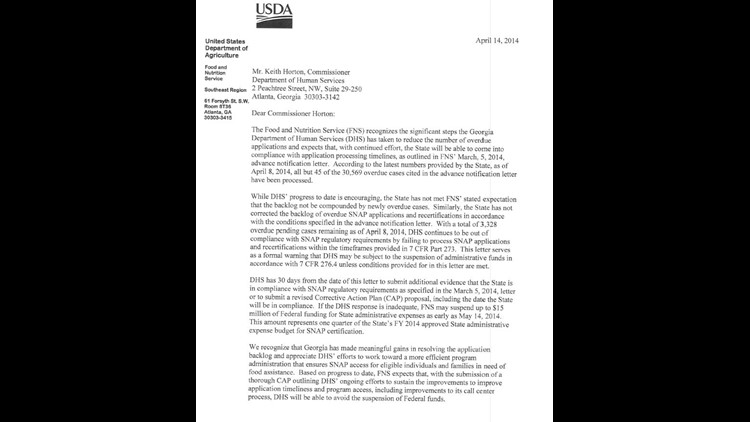ATLANTA -- Rep. John Lewis has issued a response to the warning letter Georgia received from the USDA about the state's food stamp program problems.
Georgia received a rare reprimand -- a formal warning letter -- from the USDA last month.
In response to the letter, Lewis said in a statement, "The state of Georgia seems to have become callous and indifferent to the needs of its most vulnerable people. The poor, the seniors, and the sick must travel to a state office and pay for an ID card just to register to vote. The ill and the suffering will receive no relief from the expansion of Medicaid. People who feared they might lose their homes can't receive help in time to save themselves from foreclosure, even though millions of dollars were allocated by the federal government to the hardest hit states. And now the hungry, who are looking for Georgia to offer a safety net of support are victimized by poor management, even when federal money is available.."
In the past decade, the USDA has only sent seven advanced warning letters. It's the agency's threat to cut funds if programs don't improve. But in that same time period, the USDA never felt the need to send a formal warning letter, the final step before funds are cut, until now.
"I think this is an indication that this is one of the most serious problems we've seen any where in the country," said Georgetown professor David Super, who has studied our food stamp program for more than a decade.
The latest letter from the USDA didn't come with the harsh words we've seen in the past. Even the potential penalty for failing to comply, was cut from $75 to $15 million. But Super says the letter's importance has nothing to do with words. It's that the letter was sent at all.
"This affects a great deal of public money and thousands of Georgia families that are in great distress. This seems to be something the public ought to want to know more about," said Super.
But on Tuesday, Governor Nathan Deal still had little interest in talking about the severity of the problem or even accountability. His focus remained on progress.
"Because they've been working literally seven days a week and around the clock they've eliminated almost all of the backlog," Deal said.
In a written response to the USDA, Commissioner Keith Horton called his department's achievement "extraordinary." A month earlier, DHS had 26,068 food stamp renewals past due. On April 14th, Horton said that number stood at 1,732.
The backlog is smaller, but still proof the USDA says, that even with mandated overtime, the process in place can't meet the needs of those it serves.
"They're talking about hiring more eligibility workers which they badly need and they're talking about replacing their technology which clearly doesn't work, so that's a promise of future progress. But I think what's going on now is mainly patches and I think USDA recognizes that," said Super.![David Super, Georgetown Professor [ID=7749069] [ID=7749069]](https://presto-wxia.gannettdigital.com/Portals/_default/Skins/PrestoLegacy/CommonCss/images/pullquote.jpg)
11Alive watched last week as nearly a dozen people trying to get through to the state's call center, were disconnected instead. Data given to the USDA shows 38% of the calls, or nearly 60,000 people, never got through even after the system was updated to handle 1000 people on hold, instead of 900.
Super believes the USDA dropped the ball, waiting too long to demand change. At the time its advanced warning letter was issued, the state had 166,000 backlogged cases for food stamps, medicaid and other social services - all of which are dependent on the same eligibility processing system.
"Once we get through that backlog I think we're going to be in a position to better handle it in the future," said Deal.
The Governor has been the only state leader willing to publicly talk about the situation. Even though the USDA's letters are addressed to DHS Commissioner Keith Horton and it's his program under fire, he refuses to talk on camera about it and only once agreed to answer questions by phone. The USDA has also repeatedly refused our requests for someone to comment in person.
"They're treating this as something between the two agencies, but I think it affects the public more broadly and I think we have a right to know what's going on and to have input in it," said Super.
North Carolina also received an advanced warning letter. The same day Georgia's was found out of compliance, North Carolina was let off the hook, told it had made the necessary progress to keep its funding.
CORRECTION: In our on air reports Tuesday, 11Alive erroneously reported that DHS had performed an estimated 400,000 hours of overtime to clear its backlog. The correct estimate should have been reported as 80,000 hours. According to DHS more than 2,000 employees have been mandated to perform at leat 8 hours of overtime for the past five weeks.


